Hi all!
I am so happy to announce that the application period for the 2024 cohort of the Digital Humanities Summer Scholars (DHSS) Program is open! We went fully remote for the first time in summer 2020, and once again, the program will be offered virtually for summer 2024.
The application deadline is March 29, so please contact me if you are interested in this unique summer research opportunity!
Please see the details below:
The Digital Humanities Summer Scholars (DHSS) Program is a six-week seminar with a minimum of 200 hours of work required. Funded through the Lafayette Libraries, it offers a $3,000 stipend for the 2024 program’s duration from May 14 – June 21, 2024. The 2024 DHSS program will be conducted virtually, via Zoom. While the program will be held virtually, the cost of on-campus housing will also be covered for the duration of the program for accepted Summer Scholars who request it during the application process .*
Candidates may be from any class year, as long as they are enrolled as a student at Lafayette College in the summer at the time of the program.
During the six weeks of the program, students will meet for classes and labs multiple times weekly as a group to discuss readings and develop their research questions, as well as attend workshops dedicated to learning digital tools including Gephi, TimelineJS, R, ArcGIS, etc. Past scholars have used this program to explore interests as varied as airports and urban development in Bengaluru, India; the social geography of Lafayette College; racial perceptions of anime; the history of electronic synthesizers; New York City’s subways, bridges, highways, and expressways in the 20th century; Khmer classical dance in modern pop music; labor rights considerations in eSports; disarmament in South Sudan; urban agriculture and activism in the city of Detroit, and more.
Students will present their final digital research projects at the end of the program to their fellow Summer Scholars and the Lafayette community at large during a recorded virtual event.
To find out more about this program, browse past projects at https://sites.lafayette.edu/dhss/our-projects/.
Angela Perkins, director of Digital Scholarship Services (DSS), Lafayette Libraries, and director of the DHSS program, will lead the program with support from Lafayette Libraries colleagues and Lafayette College faculty.
To apply: Prior to submitting an application, students must meet with Angela Perkins to discuss their research ideas and interests, as well as their experience (if any) with digital humanities, digital scholarship, filmmaking, digital art, computer science, web design, etc. Students who wish to apply will be given application instructions after their interview.
If you are interested and would like to interview, please contact:
Angela Perkins
The application deadline is March 29, 2024. Students will be notified of their acceptance status by April 12, 2024.
* Applicants needing on campus housing should note that on their application to the DHSS program where indicated.
Sincerely,
Angela
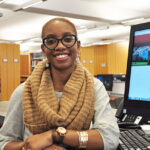
Director of Digital Scholarship Services (DSS)
David Bishop Skillman Library, Lafayette Libraries
Here are some Frequently Asked Questions:
Q: What is the Digital Humanities Summer Scholarship?
The Digital Humanities Summer Scholarship (DHSS) is a competitive, six-week seminar where students engage with Digital Humanities: learning digital tools, methodologies, and community practices in order to build a research project of their own design. They work independently and as a collective to understand and participate in rigorous original research. We are in our fifth year of the program.
Q: When is the program held? How long is it?
The DHSS program lasts 6 weeks in total. This summer’s program will run from May 14 – June 21, 2024, but any interested student should keep in mind that there are year-round program obligations, including mandatory attendance of the set of of four DHSS Idea Incubator research workshop sessions held in April 2024, final project presentations, as well as other events.
Q: Who runs this program? Where is it housed?
This program, originally funded by a Mellon grant, is currently funded by The Lafayette Libraries, and is housed in Lafayette College’s Skillman Library. The program is headed by Angela Perkins, Director of Digital Scholarship Services (DSS), and collaboratively run by members of its Research and Instruction Department, with support from Digital Scholarship Services (DSS), and many other members of our community.
As the place where disciplines, methodologies, and research expertise intersect, the Library is the natural home for the program.
Q: How much is this scholarship? Are there any other benefits that I will receive as a Summer Scholar?
The DHSS program offers a $3000 stipend and on-campus housing for the program’s duration.
Q: How are scholars selected?
Scholars are chosen through a competitive application process, which concludes on March 29, 2024 this year.
Interested students must schedule a brief interview (15-30 minutes) with Angela Perkins prior to applying. The student should be prepared to discuss their interest in DHSS, experience with digital humanities or digital scholarship, and current research interests.
After the preliminary interview, if the student is interested in applying, they will receive instructions to apply.
When considering the application for acceptance to the program, we look at the strength of the research question, the potential to design and execute a project effectively within 6 weeks, and degree of enthusiasm for their inquiry. All applicants will be notified as to the status of their acceptance to the program by April 12, 2024.
Q: How is the DHSS program structured academically?
The program is a seminar-style course with an emphasis on fluidity and flexibility in schedule in order to facilitate a creative and intellectually expansive basis for pursuit of original research, and building the final digital research project. Classes meet twice weekly for three hours, and a lab period of three hours is scheduled on Fridays.
The first two weeks focus on learning and discussion of basic research methods and methodology, in addition to creating and honing the digital project’s central research question.
The following two weeks see the Summer Scholars taking digital humanities methods and methodologies workshops, including text mining and analysis, topic modeling, data visualization, geographic information systems (GIS) and mapping, and digital storytelling.
The final two weeks are concentrated on the Summer Scholars completing practical assignments which started on the first week, including the digital project outline and plan, literature review, digital tool review and demonstrations, and research paper. These all lead up to completion of the final digital project, and presentation.
Weekly journal entries round out the required work, which serve as reflections on the challenges, blocks, and accomplishments along the research journey, as well as a documentary method which instills the importance of transparency through disciplined project management.
Q: Where can I find more information/resources/syllabus? How can I connect?
Please feel free to contact Angela Perkins, Research and Instruction Librarian, for more information at perkinsa@lafayette.edu.
____________________________________________________________________________________________________
DHSS Articles
Read about the Digital Humanities Summer Scholars Program in The Lafayette student newspaper:
Original research through new methodologies: A look at the Digital Humanities Summer Scholar program
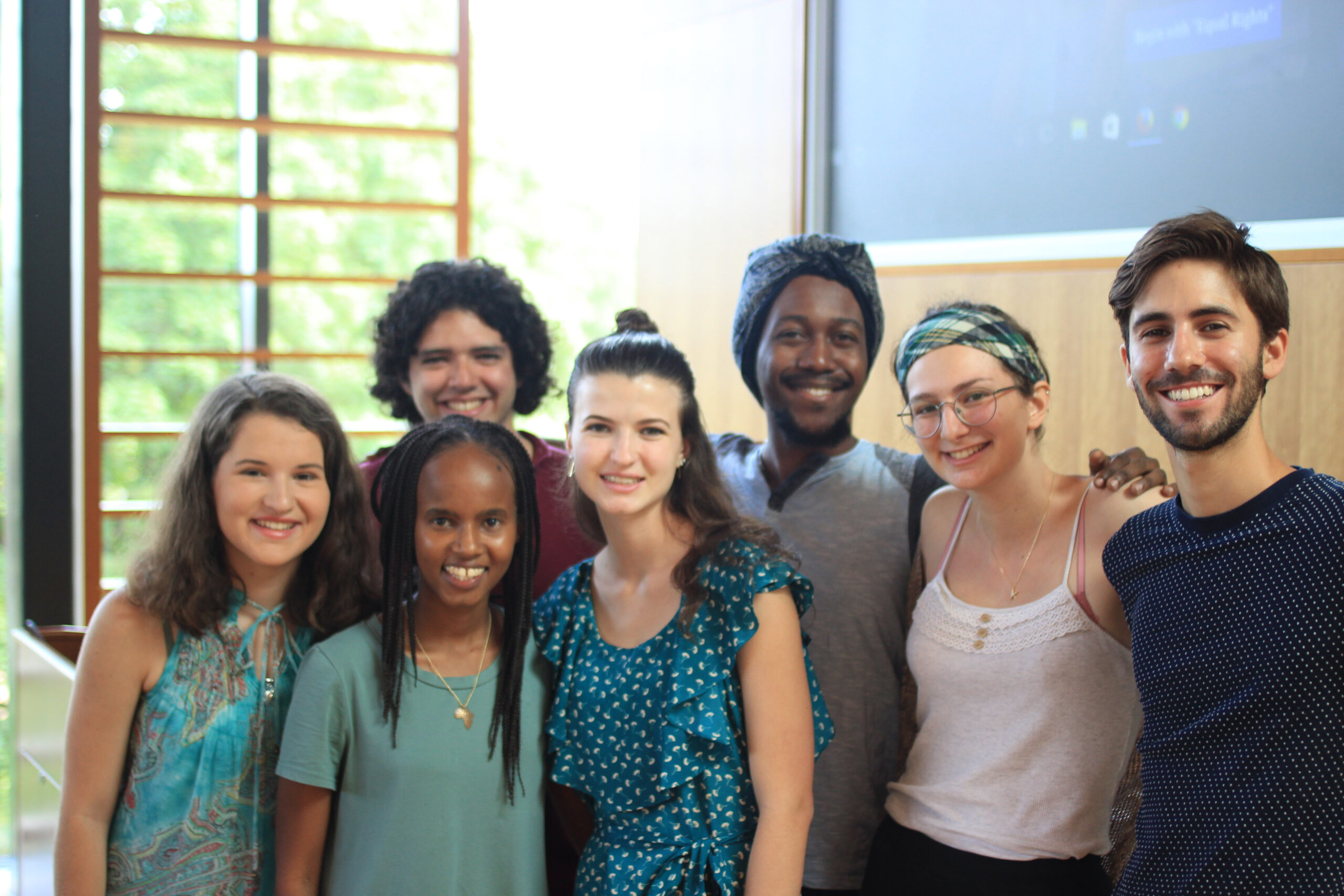
Each DHSS cohort is typically made up of seven to eight students. Photo taken summer 2018. (Photo Courtesy of Lafayette Communications)
Lafayette students have experienced almost a year of virtual learning and digital assignments. One program at the college, however, has been immersed in the digital space for years.
The Digital Humanities Summer Scholar (DHSS) program is a six-week workshop that takes place at the beginning of the summer for a select cohort of students.
Students in this program become immersed in the world of digital humanities, which, according to DHSS director Angela Perkins, is the act of using computational methods and applying them to social and cultural problems that come up in humanities. Digital humanities is a subset of digital scholarship as a whole and can encompass many methodologies, she explained.
Scholars spend their time in the program doing original research and investigating a research question that can be based in many different fields of study and doesn’t necessarily have to draw from the student’s major.
“[DHSS] is very interdisciplinary, and that’s by design,” Perkins said.
She added that summer scholars come from many different academic backgrounds, including STEM fields such as engineering and computer science.
“What I really enjoy about the program is learning that a student who has a major in one of those [STEM] fields has a really rich humanities interest underlying that, but they don’t get to manifest it very often,” Perkins said.
In the first two weeks of the program, students work to grow their topic idea and narrow down their research question. The process is meant to be collaborative within the cohort, according to Perkins.
The third and fourth weeks of the program are an introduction to the world of digital humanities and methodologies that can enhance research. Some of these may include GIS mapping, text analysis and topic modeling.
Perkins added that she would like to introduce new units this summer such as virtual reality (VR) digital storytelling.
Workshops on these methodologies are led by Perkins and other Lafayette library employees as well as faculty from the college and other institutions.
In the final two weeks of the program, scholars finish their projects and present their work to the class and the public. For some past summer scholars, the presentation experience was the most rewarding part.
“Being able to present my own work felt like I accomplished something,” said Megan Deacon ’21, a 2020 summer scholar. “But also being able to…share with researchers who were very interested in the field of digital humanities, I felt like I was part of something.”
Saide Singh ’23, another 2020 summer scholar, said that it was “amazing” to see how all of the scholars’ ideas were connected and to understand the larger movement altogether.
Singh’s research looked at how Indo-Caribbean female authors from the late twentieth century to today have used poetry as a tool to talk about their experiences, identities and womanhood. Singh said she was passionate about the topic before she applied, as she has studied it in several classes.
Milena Berestko ‘22, a 2019 summer scholar, completed research on the Romani people in both her home country of Poland and more broadly in other countries. Her work sought to find the roots of discrimination that she saw growing up.
“I see so many connections now to how so many minority groups are treated currently. And it’s way easier for me to understand their treatment in the modern way when I have a strong background in the Roma community,” Berestko explained.
And for some summer scholars, research done during the six-week program has long-term effects on their future plans.
Deacon said that while she was doing research for her project on the connections between the concept of the “femme fatale” in Hollywood movies and women’s involvement in the U.S. criminal justice system, she remembered thinking, “This. I want to do this.”
She has since used her research in an application for a post-graduate research fellowship, and said she hopes to do more with it in the future.
The DHSS program, which began in 2015, was completely virtual in 2020 and will be again in 2021.
Perkins said that the decision to take the program virtual was “not a question” and that the format of the program was a good development.
“It was really great to have a connection to Lafayette over the summer, and to keep academically involved, even though we were so distant from everyone,” Deacon said.
Perkins said she hopes summer scholars would be offered on-campus housing if it is available. Additionally, the stipend for scholars has increased to $3,000 this year.
While Perkins said that the program is difficult, she emphasized the “goodness” that comes out of the work.
“It’s a pressure cooker, but it’s the most fun pressure cooker you’re ever going to go through,” Perkins said.
This year’s virtual DHSS program will take place from May 31 to July 9. Interested students should email Perkins at perkinsa@lafayette.edu to schedule a brief interview to discuss their research ideas and interests. The application deadline is Mar. 26.
About Katie Frost
Katie Frost ’22 is the arts and culture editor of The Lafayette. She studies English and history.
____________________________________________________________________________________________________
Read about the 2020 Digital Humanities Summer Scholars Program in an article by Lafayette College Communications Division’s Stephen Wilson this past summer:
August 12, 2020
Humanities, Digitized!
Summer program has students turn intensive research into interactive sites
By Stephen Wilson
Conducting research, synthesizing it into a paper, and presenting those findings to your peers and mentors is standard fare at the College. Transforming that work into a website is less common. Doing the whole of it in six weeks from COVID-safe remote locations across the world seems almost a miracle.
Well, meet the miracle workers who participated in the Digital Humanities Summer Scholars (DHSS), a program of the Lafayette Libraries.
Students dove into a research question, scoured scholarly sources, watched that question evolve based on the research results, analyzed findings, wrote, revised, and then digitized their work.
Topics varied from the role the communist party played on the national agenda for Greek women to classical Cambodian dance in pop music to hate speech in social media about movies with Black casts.
Typically students would gather in Skillman Library over the course of May and early June, form a strong cohort, and grind on the work while supporting the ups and downs of fellow scholars.
Because of the pandemic, Angela Perkins, research and instruction librarian and director of the Digital Humanities Scholarship program, faced a big question: How do you achieve a group dynamic in an online space?
“It was different from years past,” she says. “There were many logistics to solve so we could collaborate, provide scholarly support, and be present to students’ needs. There was lots of improvisation and jumping online to talk, but I could not be more proud of the product they produced.”
Here’s a glimpse into a few scholarly projects and the process of making them take form online.
Imane Halal ’23
Anthropology & sociology and women’s, gender, and sexuality studies
Black Spaces at Lafayette College and the Social Geography of Lafayette College
Map
Research
“Physically racialized spaces affect how Black and brown students experience them …”
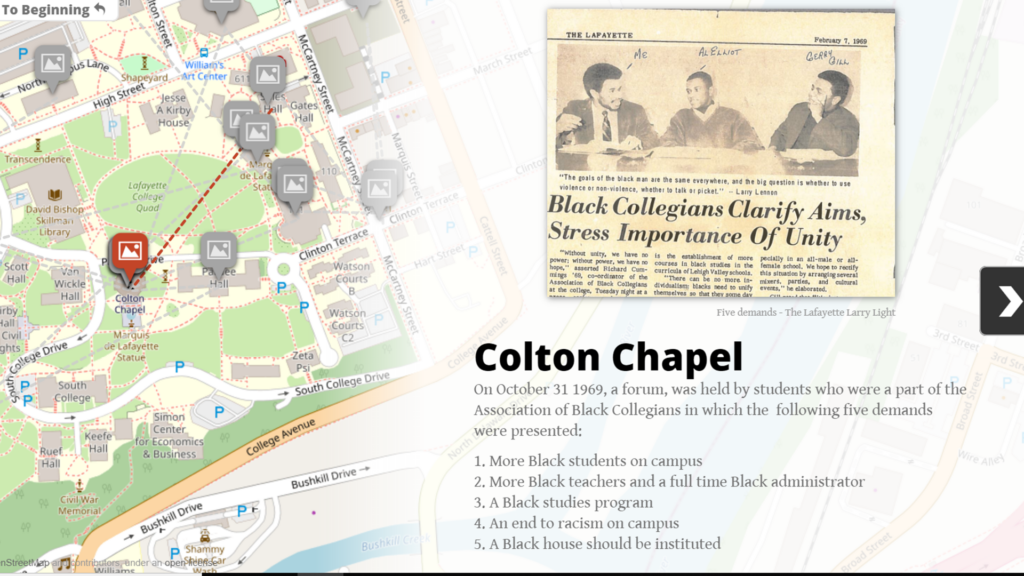
Research: Mapping black spaces on campus is not easy when spaces evolve, but Halal sought to illustrate the social geography that defines Lafayette. To do so, she had to research definitions of space and how institutions reinforce racism through space. At colleges, three distinct spaces exist: fortified, which are white and overtly racist; contradictory, which are intersectional and covertly racist; and counter, which are safe for brown and Black students. Tapping into an array of documents from the Association of Black Collegians (ABC), she then sought to create a story map for a hundred cultural and activist events.
Digitize: “I am not tech savvy,” Halal says, but she still managed to create two sites, one dedicated to her research and another to the timeline of events that occurred across campus. She spent a lot of time on the tools, changing mapping programs to best depict what she had.
Impact: “I am so glad I could make this come to life,” says Halal. She entered the program at the urging of Grayce Walker ’22 and previous DHSSers Jovante Anderson ’19 and Louis Wingfield III ’22. She also had the support of ABC. “Angela is amazing—all that she did and the resources she offered,” she says. “And the help from our student fellow Milena Berestko ’22 kept me on track.” Despite the challenges COVID presented, Halal says it was worth it.
Saide Singh ’23
English
Indo-Guyanese Women Poets
“Indo-Guyanese women writers, though not often published, memorialized their lives, philosophies, and imaginings in short breaths …”
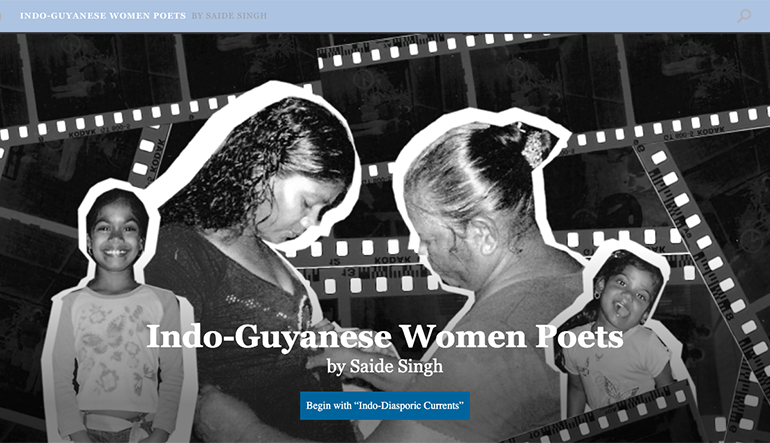
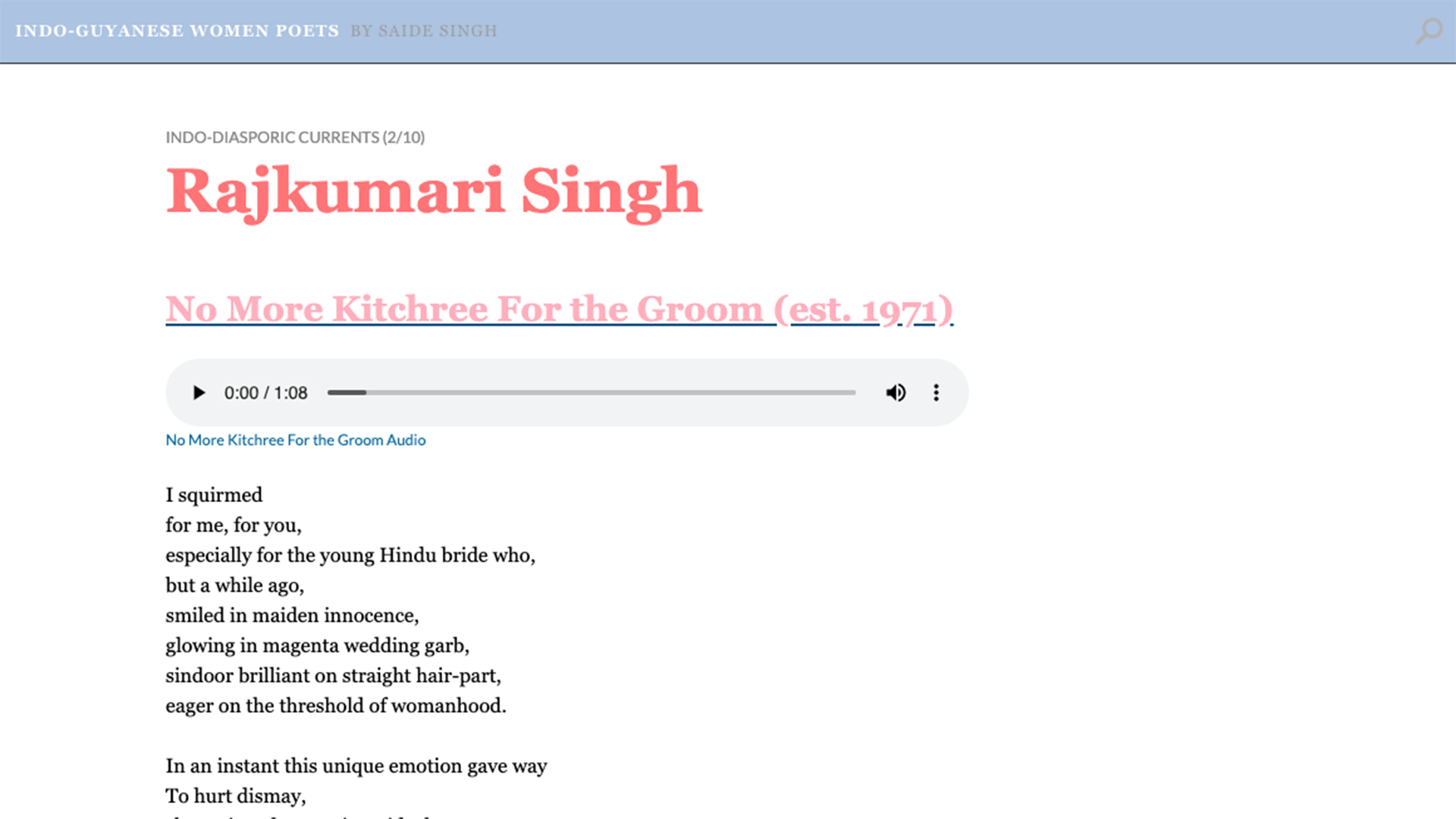
Research: The voices of Indo-Guyanese women poets are often unheard yet vital to understanding the history, culture, and experiences of the Indo-Guyanese diaspora. Singh began by tracing the legacy of Indo-Guyanese women through the research of Jeremy Poynting, founder of Peepal Press, who noted in 1965 that Indian people made up half of the Guyanese population, but Indian women accounted for less than 3% of all employees. “They are not well represented in government, academia, or social spheres,” Singh says. Finding female poets was even harder. They were not equitably published in libraries or anthologies throughout the late 20th century. Singh struggled as books were out of print and archives were not open or material was not digitized, so she searched online and contacted contemporary Indo-Guyanese poet Janet Naidu to learn more about her poetry and tap into her poetic network.
Digitize: “I had so much trouble with Scalar,” she says. “I had a vision in my head of an artistic, interactive, and grungy site, but …” Seems there are people who know how to do that work who are more skilled than “the hour of code experience” Singh brought to the project. “It was tedious, but once I was in a groove, I stayed with it.” But she is pleased with what users will see and access.
Impact: “There are so many savvy people at Lafayette who showed us how to use tools,” says Singh. “And other students were on this same journey, and to see where they started and what they presented at the end was amazing. We learned so much so quickly.”
Megan Deacon ’21
History
The Femme Fatale and the Distortion of Female Criminality
“If an inaccurate presentation of these women surrounds us in popular culture, then it is more difficult to convince people of the gross injustices of the U.S. criminal justice system.”
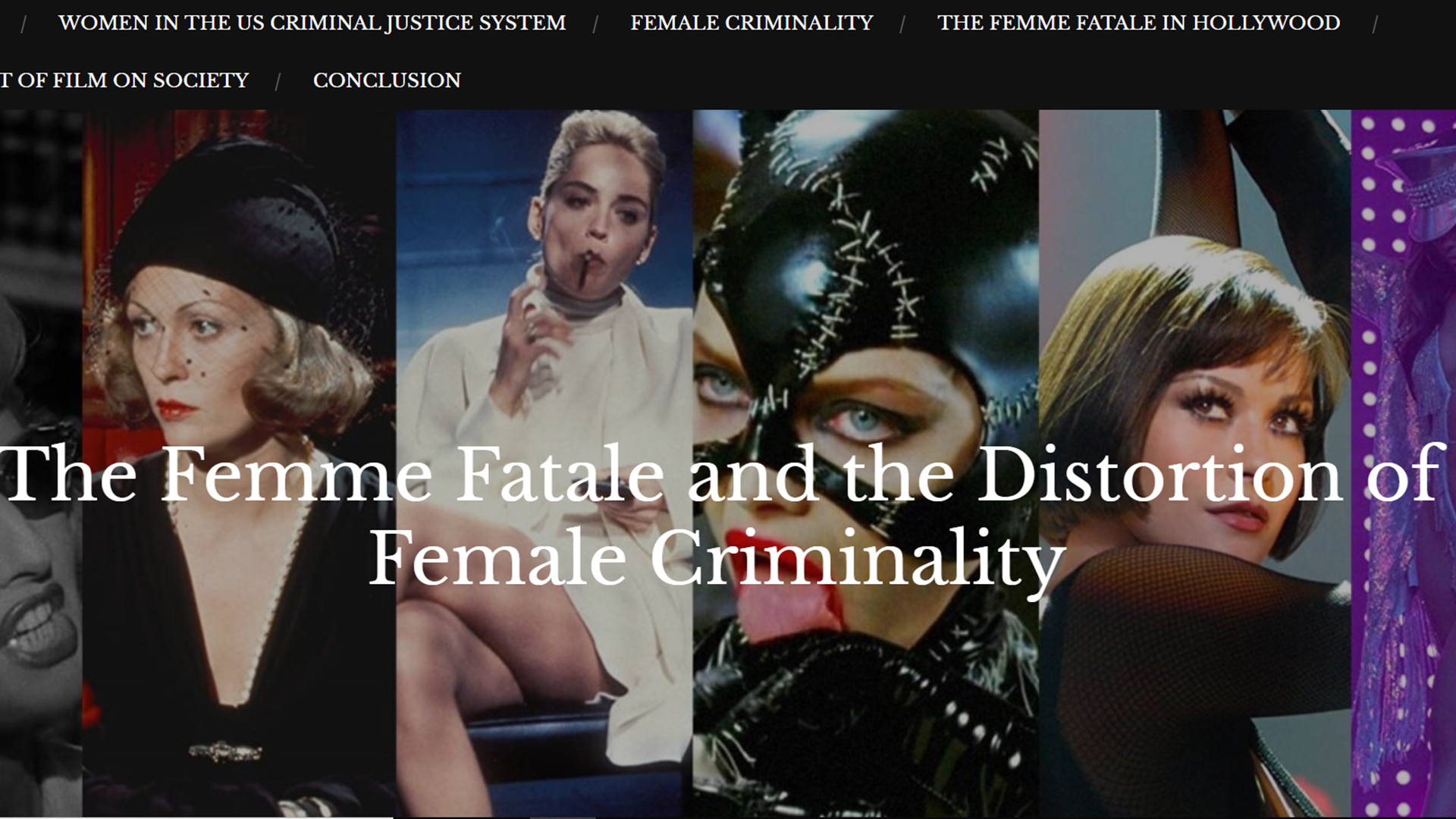
Research: The war on drugs led to many low-level offenders landing in jail for lengthy terms. Women, especially women of color, became the victims of such policies. Even as those policies came into question, women’s incarceration rates in U.S. jails rose by 15% from 2008 to 2018 while men’s rates fell by 9%. Deacon’s research made clear that drug and property crimes dominate incarcerated offenses spurred on by a childhood soaked in trauma and abuse. Hollywood seems to have missed this reality, portraying white women as violent offenders who are motivated by greed and rarely jailed for their offenses.
Digitize: Deacon had researched 60 films, but finding clips of significance of each was nearly impossible. While she had some experience with using WordPress, she found it tough when building from the ground up. Add to it the table data she wished to present. “I had data sets that were not easy to graph,” she says. But working with a librarian, Deacon used Tableau to present her data. “It was a long process,” she says.
Impact: “I have such respect for researchers and professors for what they do,” says Deacon. “It was hard and demanding.” But she appreciated the free reign to independently research an area of interest so deeply. “There was a sense of fulfillment when we were done.”
Here are links to other scholars’ projects:
Songmouy An ’22
Khmer Classical Dance in Pop Music
Rachel Cox ’21
Placing Women’s Issues on the National Agenda
Site
Timeline
Oyuntugs Gantumur ’23
Evolution of Research in Food Studies
Dawit Gebeta ’21
Anti-Black Sentiment and Black Movies
Shirley Liu ’23
Chinablock: A History of Displacement and Development in D.C.’s Chinatown
Digital Humanities Summer Scholars program was made possible by a generous donation to the Lafayette Libraries from alumnus Bruce Marshman ’62.
____________________________________________________________________________________________________
Read about the 2019 Digital Humanities Summer Scholars Program in an article by Lafayette College Communications Division’s Stephen Wilson this past summer:
August 13, 2019
Filling the Gap
Students create digital projects that shine light on oft-missed yet important topics
By Stephen Wilson
Scholars by nature pursue a passionate interest and add to a conversation, no matter the number of voices in dialogue. For some subjects, there is silence, and the scholars’ job is to begin a conversation.
Digital Humanities Summer Scholars, a program of the Lafayette Libraries, helped fill a gap in our collective culture as they traversed a six-week journey from forming a research question, scouring scholarly resources, analyzing findings, writing and revising, and then finally translating that content into the digital realm.
It’s a daunting task, but the group was up to it.
“They were super invested and worked hard,” says Angela Perkins, research and instruction librarian and also director of the Digital Humanities Scholarship Program. “The students cared about their projects, wanted to improve the cultural record, and grappled with the varying skill sets needed to digitize their scholarly work.”
The projects spanned the globe from Hindu-Buddhist architecture in Angkor City, Cambodia, to household electricity and educational performance in Madagascar. Add stops in Eastern Europe, Sudan, and Japan.
Below is a snapshot of a few projects, their creators, and the process to bring the work to life along with links to their project pages.
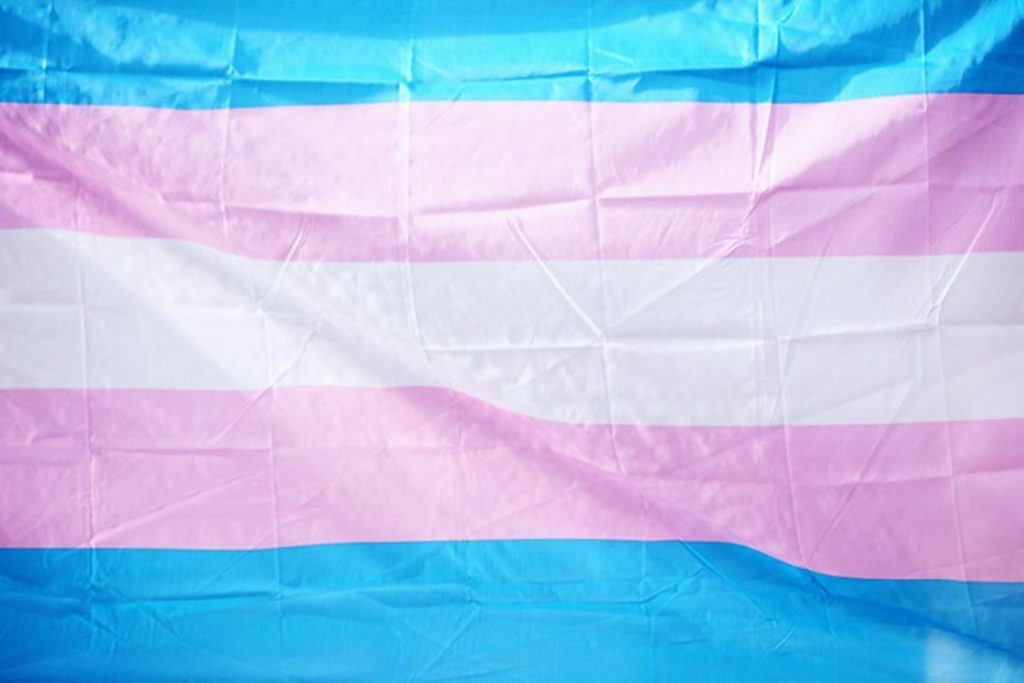
Photo by Sharon McCutcheon on Unsplash
Bec Stargel ’20
Psychology and anthropology & sociology
Defining “Transgender”
Narrowing the research question: Stargel started her project with many ideas and potential approaches but nothing solidified. She knew she wanted to focus on the LGBTQ community and language. “This was the most difficult yet most rewarding part of the project,” she says. By the end of the second week, her focus became clear: the history, use, and evolution of the word transgender.
Gathering research: She started looking in old dictionaries, but it wasn’t an entry. From there she turned to newspapers, books, scholarly articles, noting how the word changed over time. “The timeline on my site traces the medical origins, the shifts in use by people who identified as transgender, and the broader uses today,” she says. To create her timeline and project, Stargel created a database of definitions, searching for every source provided by Google Scholar that used the word “transgender” in the title between 1980 and 2010. She then read the top five most cited works for each year, about 95 articles in total. About two-thirds of those articles provided definitions of the word. “It took about two weeks to find the sources, comb through them, and create a spreadsheet,” she says. While there was great variety in definitions, some were similar.
Digitizing the work: “I knew nothing about HTML,” she says of the coding language to make a website. “So this was a stressful time.” She wanted a timeline and sections, like a traditional paper, with graphs and text. This is where the team of scholars helped. “To get my head out of my project and get suggestions or explore other avenues was helpful,” she says. “I’m proud I got to make my research accessible so it could help others.”
Value/impact: As Stargel heads into her senior year with plans to write a senior thesis, this project shaped her approaches. “I feel more confident as a researcher and discovered my strengths as a researcher,” she says. “This project also helped me refine my proposal for my honors thesis. I now know I can come up with a question and trust that it will present itself.”
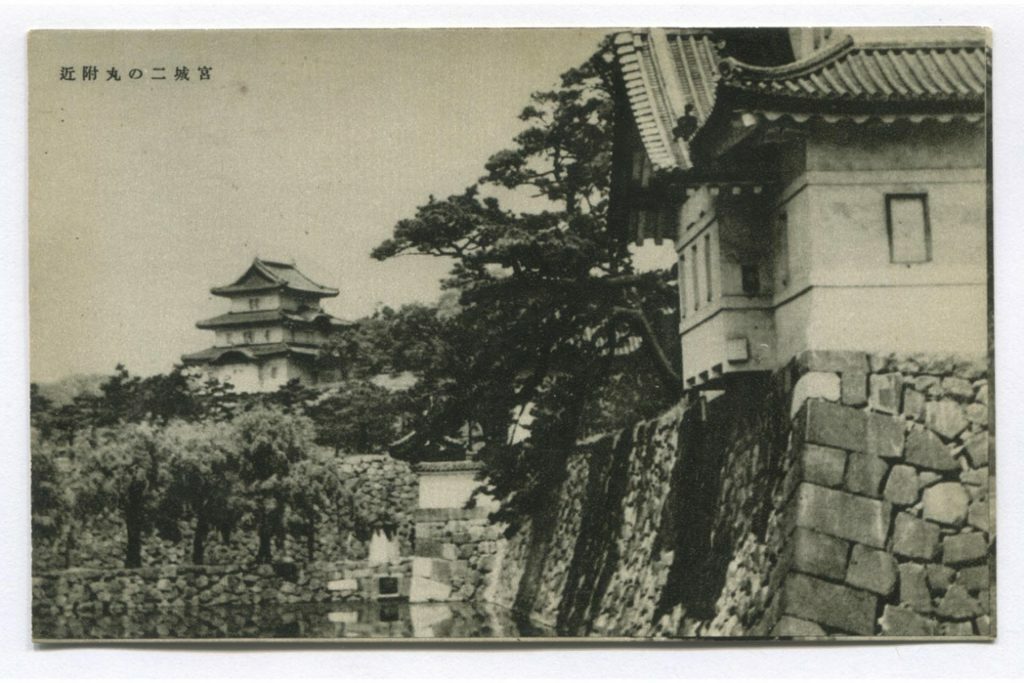
Imperial Palace Ninomaru Neighborhood 宮城二の丸付近
Ren Makino ’20
International affairs and Asian studies
66 Images of Tokyo: Postcards from the Magazine Shufu no Tomo (主婦の友)
Narrowing the research question: “I didn’t have much of a research question,” confesses Makino. “The College has a fabulous East Asia Image Collection, and I wanted to find a way to make images that could be part of the EAIC more accessible and visual.” Makino has a research interest in pre- and post-war Japan. The collection had a full set of postcards, a marvelous historical artifact of photographs of places across Tokyo, that came as a “special gift” in the September 1932 issue for women who purchased the magazine Shufu no Tomo.
Gathering research: “The postcards came out a year after the Manchurian Incident when the ultra-nationalist prewar Shōwa period was leading the country towards militarism,” says Makino. “But there were remnants of the period before nicknamed ‘Taishō democracy,’ where individuality flourished.” In the 1910s and early 1920s, women increased their marriageability through traditional methods, like flower arranging and tea ceremony, but by the mid-1920s, marriageability could be increased through self-cultivation. “The postcards served as a vehicle of that self-cultivation by exposing women to the real-life aspects of Tokyo,” he says. The cards also represent consumer capitalism as interspersed between the images were ads for powdered milk, shampoo, and heel lifts. “The magazine was read by urbanites and rural workers who could be influenced by the messages,” he says.
Digitizing the work: Makino created a map, locating each image on it. Such a task demands patience especially when some of the buildings have long been destroyed or rebuilt. “The postcards came with a map,” he says. “It showed a general location which I had to confirm by comparing maps from across the decades.” Geolocation takes time, getting the exact longitude and latitude. More time consuming was translating the number of old characters. “There are characters that are unused today because of post-war reforms,” he says. “I had to consult with many people to ensure I had the wording correct.”
Value/impact: “In our digital world, there is so much more information available that it can be hard to know what is the most important,” he says. “I wanted to simplify the process for others who are looking to find valid information whether they are academics who want to look at the postcards with the geolocation in mind or people who are generally interested in Tokyo.” Makino signed up in hopes to bridge that digital gap, but he learned how much work goes on behind the scenes. “My site looks alright,” he says. “It is hard to know all the work that remains in the background and is easy to take for granted.”
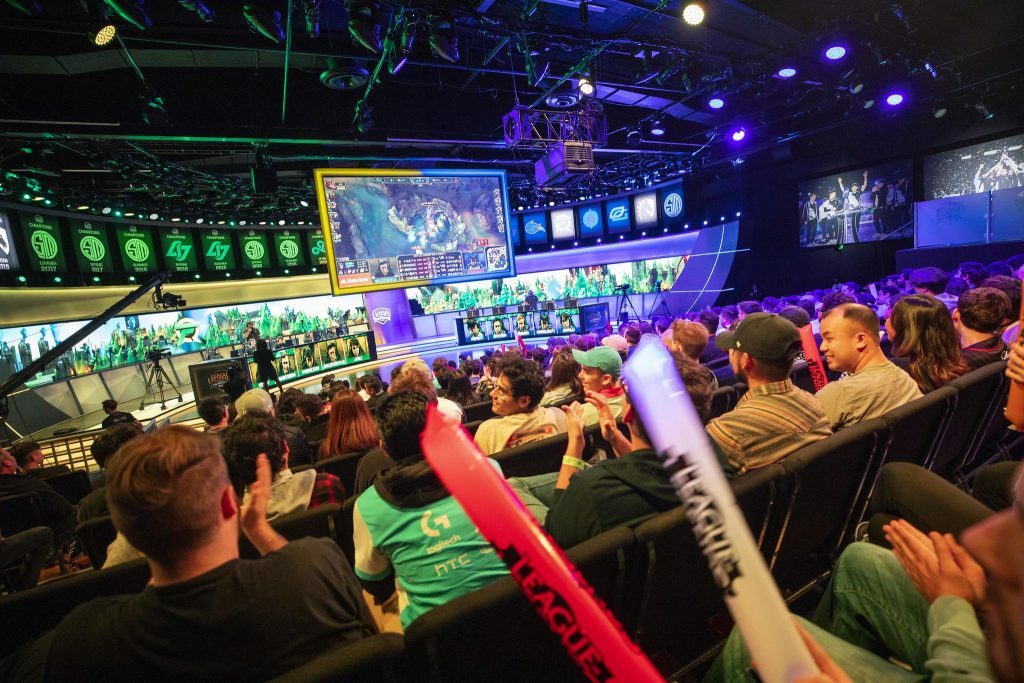
FANS ENJOYING AN LCS MATCH FEATURING TEAMS COUNTER LOGIC GAMING AND TEAM LIQUID. IMAGE VIA RIOT GAMES
Joseph Illuzzi ’21
Economics and policy studies
Labor Rights Considerations in eSports: A Policy Analysis of North American League of Legends & Riot Games
Narrowing the research question: Major league sports have governing bodies. But in the billion dollar esports world, governing bodies don’t exist … or reside solely in the hands of the game developer. “That means there are no protections for players,” says Illuzzi. “No punishment limits, minimal judicial review, and often no appeals processes.” In the growing world of esports, this can make working conditions for players and teams unfair. He focused on a specific game, League of Legends, and worked to outline many key definitions, abuses, and remedies.
Gathering research: “Much of the industry is hidden,” he says, “so I couldn’t look up players’ contracts or industry standards.” Instead, he conducted a policy review of every North American competitive ruling since 2011, nearly 40 in total. Much of the discussion about these rulings lives in spaces where gamers talk, like Twitter and Reddit. He compared the rulings to their accompanying rulesets and standards in traditional major league sports and found that many were generally fair, but a few set a problematic precedent.
Digitizing the work: His formats in the digitizing tools didn’t fit the work that Illuzzi envisioned, so he made a format that might better explain the subject and not overly complicate it. “This is an academic work, but I wanted a platform that fits the esports scene so it might be read by players,” he says.
Value/impact: “This was an exercise in time management,” he says. “I had to throw out ideas and not get tunnel vision in the six weeks we had.” The process also made him take ideas and make them more consumable and succinct. “I want to prompt more esports research,” he says. “And help shift the cultural perception away from esports being a bunch of nerds in their basement. Esports is not a cultural fad but rather a developing profession.”
More scholars’ work
Milena Berestko ’22
Psychology and theater
The Mosaic of Romani World
Victoria Puglia ’21
International affairs
Examining the Perpetuation of Violence in the South Sudan Civil War
Tafita Rakotozandry ’22
Electrical and computer engineering
Household Electrification and Education Performance in Madagascar
Aidy Ung ’21
Civil engineering
Hindu-Buddhist Architecture in Angkor City
Digital Humanities Summer Scholars program was made possible by a generous donation to the Lafayette Libraries from alumnus Bruce Marshman ’62.
Read about the 2018 Digital Humanities Summer Scholars Program in an article by Lafayette College Communications Division’s Stephen Wilson this past summer:

Photo by Stephen Wilson
Kung Fu Witch Train
Digital humanities summer scholars turn original research into engaging online presentations
By Stephen Wilson
Mention the word “anime” to people and it conjures different images. None more striking than the associations between white and black Americans.
Uchechi Anomnachi ’19 ought to know. In six weeks as a digital humanities summer scholar, he developed a detailed timeline that shows the very different paths anime entered into white and black cultures and the varied connotations that came with it.
On the one hand there’s the science fiction-loving nerd passing a VHS tape of Japanese animation to his friends in a fan club. On the other is a hyper-masculine hip-hop artist dropping rhymes, adopting pseudonyms, and wearing styles that pay homage to martial artists like Bruce Lee.
A cultural intersection occurs in the 1990s when the cartoon Dragon Ball Z first airs. The show blends science-fiction tropes and martial-arts spectacles with heroic struggles by a strong male character.
Anomnachi and six other scholars dove fast and hard into topics that ignited their passions, activated their research, and pushed them to convey that scholarship in a digital sphere.
Angela Perkins, research and instruction librarian at Skillman Library, led the scholars through the intensive seminar that gives Lafayette students a unique opportunity to conduct their own original research.
Under the guidance of Skillman librarians, college faculty, and even their past scholars, summer scholars not only learn the basics of how to perform credible, solid research, but they also incorporate digital tools into the collection, analysis, and presentation of their respective projects.
“I wanted the students to work in a holistic way,” Perkins says. “To mine the texts more deeply, to generate intellectually sound research, and to select technically advanced methods to display their findings.”
She sought scholars who would rise to the occasion.
Alex Murrell ’19 spoke with Perkins in the spring because of her similar interests.
“I have always been fascinated with library sciences and heard that Perkins attended graduate school in my hometown of Austin, Texas,” says Murrell. “After speaking with her, I knew I wanted to be a part of this opportunity.”
While Murrell was unsure of her project’s topic during those conversations, she knew that playing with the tools and methodology were crucial to her development as a thinker and researcher.
Murrell dove into the occult. For nearly 200 years, the second-most-purchased book, behind the Bible, was Malleus Maleficarum, Latin for The Hammer of Witches. The text serves as a kind of instruction manual to help identify and avoid collusion with the devil via sorcery and witchcraft.
She discovered the text as noting many references to the book while working on an independent study in art. She wasn’t quite sure what to do with the book as a scholar.
“Perkins was always honest with me,” says Murrell. “She would tell me if I should try a different direction and served as a sounding board to my many questions and ideas.”
The project approach has her hooked. She plans to develop her site further and present at two conferences.
As a native New Yorker, it seemed fitting for Ben Gordon ’19 to explore the subway.
“It’s what people in the city talk about,” he says. Maybe complain is a more appropriate word.
Gordon’s research took the form of maps, each one tracing the evolution of the transit system—when the subway’s development began and then ended and how it got replaced by the car.
His maps layer in population density. He illustrates how real estate agents used subway lines to develop upper-class neighborhoods. As soon as the masses could avail themselves of the subway, the automobile took over with highways, bridges, and expressways cutting across the city to the benefit of the upper class.
Gordon’s project is deep and wide. “I was spending 50 hours a week on it,” he says. “There was a real intensity to the project, but it was so worth figuring out.” He thinks his capstone project will focus on this same topic since there is more to explore.
All agree that the whirlwind nature of this program combined with surprises while researching and the shifting focus of their central questions, help from previous scholars, and comradery of the students made for a fantastic opportunity in group learning, original research, and wielding digital tools.
View all the projects in detail:
- Uchechi Anomnachi ’19, Racial Perceptions of Anime in the United States
- Ben Gordon ’19, New York City’s Subways, Bridges, Highways, and Expressways in the 20th Century
- Elene Jalagonia ’20, Making of Ethnic Nationalism
- Trang Le ’21, Intersection of Hybrid Identities in Ocean Vuong’s Diasporic Poetry
- Norman Lee ’19, Communication Deficits Between Fields Integral to the Epistemology of Sentiment Analysis
- Alex Murrell ’19, Volatica
- Angela Shi ’21, Travel Writings of Jerusalem in the Middle Ages
This year’s DHSS program was made possible by a generous donation to the libraries from Bruce Marshman ’62.